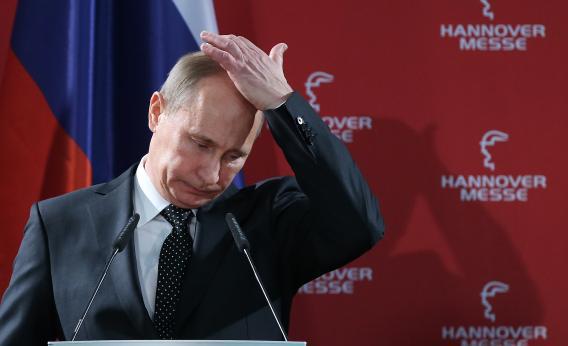Just hours after the Boston Marathon bombings, Russian President Vladimir Putin condemned the act as a “disgusting” crime and offered to help in any way he could.
Now’s his chance.
The Tsarnaev brothers appear to have Chechen roots; the older, now-deceased brother, Tamerlan Tsarnaev, may have touted radical Islamists on his YouTube site. (The only question is whether the site’s holder is the same Tamerlan Tsarnaev.) There is no doubt, then, that Putin has a big interest in helping out with the FBI’s investigation—a much bigger interest than he did on Monday, before the Chechen link was suspected. More to the point, there is very little doubt that he also has the means to help out.
Putin’s popularity, in the early years of his presidency, stemmed largely from his hard-line tactics against the Chechen rebels, who were waging a separatist insurgency in their southern province and, to that end, launching terrorist attacks in Moscow. During that era, in the mid-to-late 1990s, the rebels, though mainly Muslim, were motivated largely by nationalism—as were the leaders of Chechen rebellions dating back to the 19th century. But as Putin put down the insurgency with increasing force, the survivors grew more and more radical, and in the past few years, the movement has taken on explicitly Islamic colors, including an alliance with al-Qaida. This has only hardened Putin’s determination to defeat them.
One result of this: Russian intelligence services are all over Chechen radicals. That means that if—and this is a very big if—the Tsarnaevs had ever been in touch with Chechen radicals or with Islamists elsewhere who have ever been in touch with Chechen radicals, then Putin’s spy agencies have a record of it.
Putin has another reason for getting engaged in this probe. The 2014 Winter Olympics are taking place in Russia—specifically in Sochi, near the Black Sea and the Caucasus Mountains, only 300 miles from Chechnya. Putin’s biggest political and public-relations nightmare is a terrorist attack disrupting his Olympics, his grand moment on the world stage.
U.S. and Russian counterterrorism agencies already have a history of cooperating in tracking common enemies. If a joint effort plays some role in shining light on the Boston bombers’ motives or wider networks (if there are wider networks), that would strengthen these ties considerably—and possibly enhance the safety of the coming Olympics.
President Obama has been exploring avenues for another “reset” of Russian-American relations. At least when it comes to counterterrorist operations, Putin is too. Depending on how the next few hours or days go, Boston may serve as an opportunity for these two powers to start over.
Update, 1:46 p.m.: Breaking news that Tamerlan Tsarnaev traveled to Russia in January 2012 and didn’t return until July strengthens my point about what Putin could do. Was Tsarnaev visiting family (his father lives in Dagestan), getting training from terrorists, sightseeing, or all of the above? We don’t know, but Russian intelligence could find out.
Read more on Slate about the Boston Marathon bombing.
